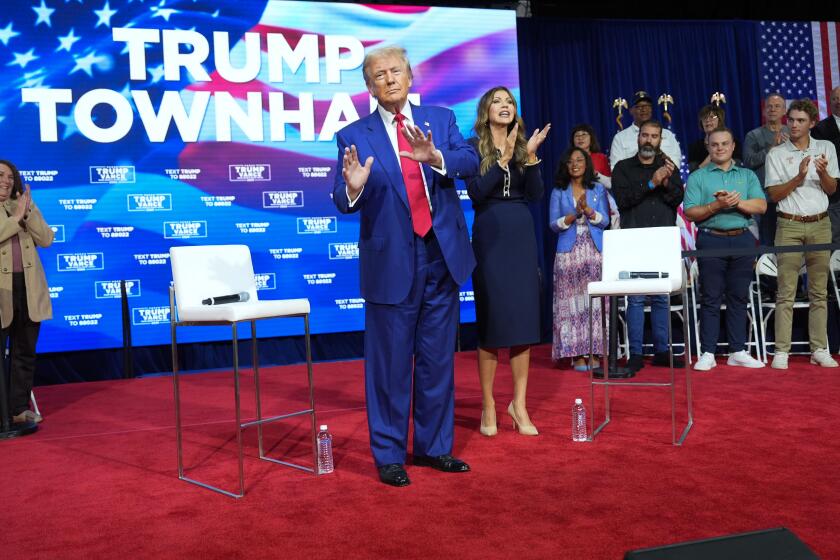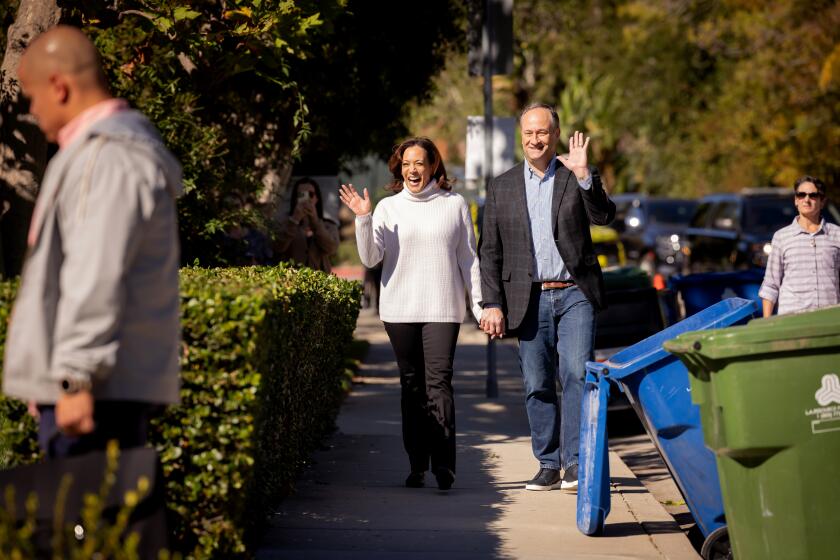Gore, Bradley Make Pitches to Partisans
With all signs indicating a tightening race for the Democratic presidential nomination, Vice President Al Gore unveiled a more personal and emotional political pitch Saturday as he shared a stage with rival Bill Bradley for the first time in the campaign.
Using a wireless microphone--a la Republican Elizabeth Hanford Dole--and walking out from behind the lectern, Gore delivered an unusually passionate speech to a gathering of the Democratic National Committee here.
“I’m going to work my heart out to earn your vote,” Gore declared at the outset of a 30-minute speech in which he spoke at length about his background, endorsed a long list of Democratic priorities and lashed at GOP front-runner George W. Bush.
Bradley, speaking with reading glasses perched atop his nose, took a more measured approach. He alternated lyrical descriptions of his family’s small-town roots with earnest calls for campaign finance reform, new offensives to reduce the number of children in poverty and expanded access to health insurance. Despite the nation’s strong economy, he said, “our job is not done.”
Bradley’s Early Strength Surprising
Adding to the drama of the back-to-back appearances was a new CNN/Time poll that showed Bradley with a narrow lead over Gore in the critical first primary state of New Hampshire. Bradley’s surprising early strength in the campaign has unnerved many Gore backers, intensifying pressure on the vice president to sharpen his performance at events like this.
Both men drew positive responses Saturday, but whereas most of Bradley’s applause came from young supporters crowded into seats at the back of the room, Gore generated several sign-waving standing ovations from the actual DNC members in the front.
“They were both more at ease than they have been in the past,” said Richard Bayard, a DNC member from Delaware who is uncommitted in the race. “But I think surprisingly the most improved speaker was the vice president. He was more at ease, more fluid, more passionate in his ideas.”
This first joint appearance by the two rivals came amid clear evidence that Bradley is gaining momentum in his challenge. On Thursday, the former senator from New Jersey was endorsed by retiring Sen. Daniel Patrick Moynihan (D-N.Y.), the respected party figure who, in explaining his decision, brusquely insisted that Gore could not win a general election. Then came the CNN/Time poll, showing Bradley now leading, 44% to 41%, in New Hampshire, even as Gore maintains a substantial 52%-to-29% lead nationally.
Several recent polls had shown Bradley gaining ground on Gore in New Hampshire; the new survey was the first to show him ahead.
Bradley may receive another boost later this week--some analysts suspect the candidates’ financial reports for the third quarter, which ends Thursday, could show him with more cash on hand than Gore--largely because the vice president has spent heavily on staff and travel.
With Bradley proving a more competitive challenger than initially anticipated, the DNC members themselves are looming larger in the Gore campaign’s strategy. All 428 are “super delegates,” with a vote at next summer’s Democratic National Convention in Los Angeles. Gore is increasingly counting on support from them and the other 289 super delegates, almost all of them current elected officials, to help him amass the 2,184 delegates needed for the nomination.
So far, Gore holds a clear advantage among the DNC members, some of whom remain suspicious of Bradley for briefly considering a third-party presidential bid in 1995 after announcing his retirement from the Senate. To subtly underscore the point and play off Gore’s first name, his DNC supporters wore buttons that read: “ALways a Democrat.”
In their remarks, neither man directly criticized--or even mentioned by name--the other. Though in earlier speeches Bradley has suggested the Clinton White House has lacked “big ideas,” before this highly partisan Democratic audience he praised the administration’s record on both the economy and race relations.
Voicing Support for Democratic Priorities
But Bradley insisted the party would benefit from “a real contest with real choices.” He added: “I also hope we can show people that politics doesn’t have to be about negative campaigning.”
Gore pledged his allegiance to a litany of Democratic priorities--from protecting legalized abortion to easing union organizing and passing tougher hate-crime legislation.
And, as he has throughout this year, Gore focused his fire on Texas Gov. Bush rather than Bradley.
“I would say to the Republican front-runner: Why don’t you join us to take the weapons of evil out of the hands of evil-doers?” Gore declared, referring to Bush’s recent declaration that a “wave of evil” rather than easy access to guns is responsible for the spate of deadly mass shootings in America.
Emphasis on Personal Record
The closest Gore came to criticizing Bradley was when he underscored his own opposition to school vouchers and to raising the retirement age for Social Security--both positions that Bradley has indicated support for in the past.
But Gore put much more emphasis on fleshing out his personal history, as he wandered the front of the room with one hand casually in his pants pocket.
Explaining his interest in civil rights, he told of how his father, the late Sen. Al Gore Sr., had shown him slave manacles in the basement wall of a mansion near his hometown of Carthage, Tenn., drew raves from many at the meeting.
More to Read
Get the L.A. Times Politics newsletter
Deeply reported insights into legislation, politics and policy from Sacramento, Washington and beyond. In your inbox three times per week.
You may occasionally receive promotional content from the Los Angeles Times.










